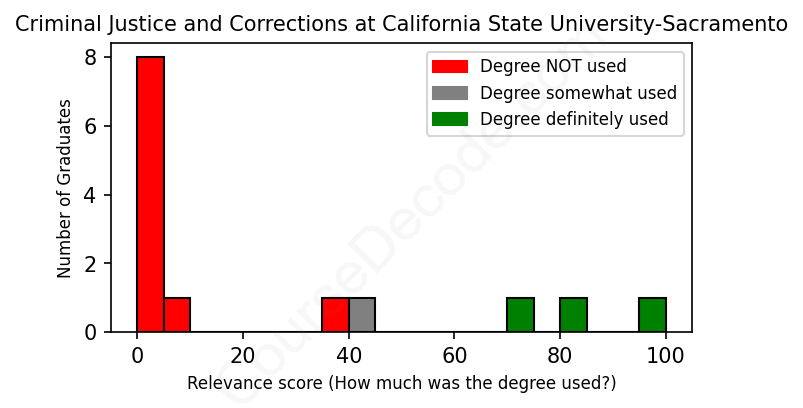
First, some facts. Of the Criminal Justice and Corrections graduates from California State University-Sacramento we've analyzed , here's how many have used (or NOT used) their degree in their career:

These are estimates based on AI analysis of 14 LinkedIn profiles (see below).
The verdict? Horrible! Overall, with an average relevance score of 24%, Criminal Justice and Corrections graduates from California State University-Sacramento have an exceptionally lower likelihood (-43%) of finding work in this field compared to the average graduate across all fields:
And for comparison, here's the chart for all profiles we've looked at across all degrees.
Also, after graduating, only 28% of these graduates have pursued further education other than another Bachelor's degree (such as a Masters degree or other), compared to the average across all profiles of 35%. This suggests a Bachelors degree is enough for most Criminal Justice and Corrections graduates, and it's normal to look for work straight after graduation.
See the details:
|
Relevance score: 44% We think this person has gone into a career only somewhat relevant to their degree. We think this person has gone into a career only somewhat relevant to their degree.
DEGREE INFOGraduated in 2012 from California State University-Sacramento with a Bachelor of Science (BS) in Criminal Justice and Corrections. No other secondary education since. JOB HISTORY SINCE GRADUATIONStaff Services Analyst California Highway Patrol May 2015 - Sep 2016 Telecommunications Technician  showNets, LLC Aug 2014 - Present Associate Governmental Program Analyst  California Department of Health Care Services Sep 2016 - Apr 2019 Staff Services Manager I  California Department of Health Care Services May 2019 - Dec 2019 Staff Services Manager I Specialist  California Department of Health Care Services Dec 2019 - Present ABOUTNo information provided. |
The top 10 most common jobs done by the graduates we've analyzed (ranked most common to least) are:
When looking at the career paths of those who studied Criminal Justice and Corrections at California State University-Sacramento, it seems like many graduates have drifted into roles that don't really connect with their degree. A lot of them have taken jobs in claims processing or administrative roles, like claims representatives or examiners. These types of positions heavily focus on paperwork and don't require a deep understanding of criminal justice or corrections principles, which makes them feel pretty disconnected from what they studied in college. It’s kind of surprising to see how many ended up in things like workplace safety or operations management in security companies, areas that lean more toward business management than the criminal justice system.
On the flip side, there are some who found their way into positions that are more aligned with their degree. For instance, roles like police officers, case managers, and resident support specialists do use the skills and knowledge gained from a Criminal Justice education. These jobs involve working within the criminal justice system or engaging with communities that might benefit from that kind of expertise. Overall, while there are a few graduates making an impact in relevant roles, the majority seem to have ended up in jobs that don't really connect back to their education in Criminal Justice and Corrections, which could be a bit disappointing for those looking to make a difference in that field.
Here is a visual representation of the most common words in job titles for Criminal Justice and Corrections graduates (this is across all Criminal Justice and Corrections graduates we've analyzed, not just those who went to California State University-Sacramento):

When looking at the career trajectories of graduates from California State University-Sacramento’s Criminal Justice and Corrections program, it seems there’s a bit of a mixed bag. Many of the graduates find themselves in roles that are somewhat connected to the field of criminal justice right after graduation. For instance, early jobs often include positions like police officer, operations manager in security firms, or roles at government agencies like the California Highway Patrol and various departments of health services. This shows that many students land in positions that are at least on the periphery of their studies, diving into areas where they can leverage their degree right away.
However, if you look a little deeper, five to ten years after graduation, there appears to be some drift away from core criminal justice roles. While some alumni, like those who started in police work, do progress in related security management fields, others veer into unrelated territories like marketing, sales, or even teaching. It’s a bit concerning because it suggests that not all graduates remain on the path directly correlated with their major. Some people do find rewarding careers in relevant fields, but it can also lead to roles that don’t quite resonate with the expertise they developed in college. So, it’s essential for students to consider both their passion for criminal justice and the variety of options available as they move forward in their careers!
Getting a Bachelor’s degree in Criminal Justice and Corrections at California State University-Sacramento is generally considered to be on the moderate side in terms of difficulty. It's not overly easy, but it’s also not as tough as some other majors. You'll have to dig into topics like criminal law, ethics, and the justice system, and there are a fair number of assignments and readings. Some students find it manageable and engaging, especially if they have a genuine interest in the subject. However, like any degree, it requires time and effort, so if you're willing to put in the work and stay organized, you should be just fine!
Most commonly, in the LinkedIn profiles we've looked at, it takes people 2 years to finish a Bachelor degree in Criminal Justice and Corrections.
Looking at these Criminal Justice and Corrections grads from CSUS, it's a mixed bag in terms of how much they’re earning. Some folks seem to have landed solid positions, especially those who’ve moved up the ladder in places like Sedgwick and Security Industry Specialists, where management roles often come with decent pay. However, others, like the teaching interns and clerk positions, might be starting off at lower salaries, which is pretty common in those fields. Overall, it seems like a few have probably made out well compared to others, but it really depends on the specific roles they're in and how quickly they've moved up in their careers. So, while some might be doing just fine financially, others might still be working their way up the income scale.
Here is a visual representation of the most common words seen in the "about" section of LinkedIn profiles who have a Bachelor degree in Criminal Justice and Corrections (this is across all Criminal Justice and Corrections graduates we've analyzed, not just those who went to California State University-Sacramento). This may or may not be useful:

Here are all colleges offering a Bachelor degree in Criminal Justice and Corrections (ordered by the average relevance score of their Criminal Justice and Corrections graduates, best to worst) where we have analyzed at least 10 of their graduates:
| College | Score | Count |
|---|---|---|
 American Military University American Military University
|
52 | 13 |
 Bridgewater State University Bridgewater State University
|
50 | 13 |
 University of Central Florida University of Central Florida
|
47 | 14 |
 University of North Texas University of North Texas
|
47 | 14 |
 University of Phoenix University of Phoenix
|
41 | 23 |
 University of Cincinnati University of Cincinnati
|
41 | 12 |
 Sam Houston State University Sam Houston State University
|
35 | 22 |
 John Jay College (CUNY) John Jay College (CUNY)
|
35 | 12 |
 Ferris State University Ferris State University
|
34 | 14 |
 Florida International University Florida International University
|
31 | 17 |
 Liberty University Liberty University
|
31 | 10 |
 California State University-Sacramento California State University-Sacramento
|
24 | 14 |
 Colorado Technical University Colorado Technical University
|
24 | 16 |